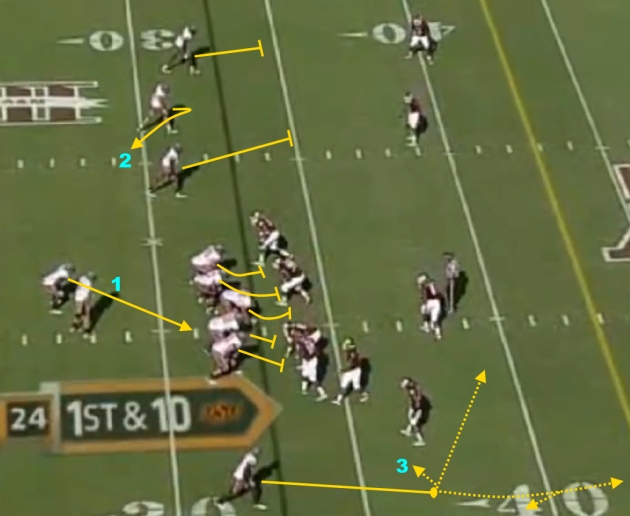
Football analysis and strategy from Chris B. Brown
New Feature: Football Strategy’s Tech-Fueled Future
-
New Feature: Football Strategy’s Tech-Fueled Future
I wrote a feature for Wired on what football strategy will look like in 50 years: Over the last few months I’ve asked a number of coaches at a variety of levels what they thought football strategy would be like in 50 years. Given that, as a profession, coaches tend to be focused on immediate…
Read more about New Feature: Football Strategy’s Tech-Fueled Future
-

New Grantland — The Future of Playcalling: “Packaged plays,” Tecmo Bowl and a revolution in how we define “football play”
It’s now up on Grantland: Admittedly or not, most fans think of real-world play calling as a slightly more complicated version of this “Tecmo Bowl model.” The offense’s job is to “keep the defense guessing,” and the defense must “guess right” to make a stop. On some level, even with their lengthy play sheets and reams…
-

Advanced Trends in Packaged Reads and Concepts
This article is by Patrick McCarthy. You can follow him on twitter at @patdmccarthy. Any and all questions are encouraged. After graduating from the University of Minnesota, he played and coached in France and Sweden while also coaching at St. Thomas Aquinas HS (KS) and Neenah HS (WI). Since then he has coached at the…
Read more about Advanced Trends in Packaged Reads and Concepts
-
Cool “trick” formation empty set series
Via Derek Leonard of Rochester high school. Note that the quarterback for Rochester was Wes Lunt, who is now the starting quarterback at Oklahoma State.
Read more about Cool “trick” formation empty set series
-
Paragraph of the day, red zone playcalling edition
Red Zone Play-Calling On a first down Red Zone play, teams are more likely to score if it’s a run than a pass if they are at the 8 yard line or closer. Anything between the 9 and the 20 favors a pass on first down. That doesn’t mean that 100% pass is the optimal…
Read more about Paragraph of the day, red zone playcalling edition
-
Combining quick passes, run plays and screens in the same play
Given that humans lack clairvoyance, there is no such thing as the perfect play-caller and thus much of the development in football strategy has centered on how to get into (or out of) a given play because the defense is well suited to defend the one that was called. Indeed, quarterbacks have called audibles at…
Read more about Combining quick passes, run plays and screens in the same play
-
Game planning (and game theory) wisdom from . . . Lane Kiffin
From the 2011 Nike Coach of the Year Clinic: Each year we do a self-scout at the end of the year…. After the review, we could see where we made mistakes of adding plays that we did not have time to perfect. We have decided to stop running plays we add late in the week,…
Read more about Game planning (and game theory) wisdom from . . . Lane Kiffin
-
NFL Team to Watch – Sam Bradford’s St. Louis Rams
When it comes to football as stimulating entertainment, not all teams are created equal. This is part of my pre-season series on Teams to Watch, which literally means to “watch their game,” not necessarily to “watch out for” (though it can mean that too) The St. Louis Rams, who went 7-9 in 2010, were not…
Read more about NFL Team to Watch – Sam Bradford’s St. Louis Rams
-
Why it’s almost always a bad idea to go for a two-point conversion in the first half
The 2000 Outback Bowl, one of the most entertaining games in the ballyhooed “Big 10 vs. SEC” category, featured (at the time) the “largest comeback” in bowl history. Purdue, on the strength of game MVP Drew Brees’s four touchdown passes, built a 25 – 0 lead in the first twenty minutes. But Purdue lost 28-25…
-
How do NFL players memorize all those plays?
Dilfer said it’s a three-year process to own a particular playbook. Owning a play is different from memorizing it, Dilfer explained. “Owning it to me goes from knowing it to understanding it to it becoming instinctive,” Dilfer said. How does one own the plays? “If you’re not spending an hour every day in your playbook,…
Read more about How do NFL players memorize all those plays?